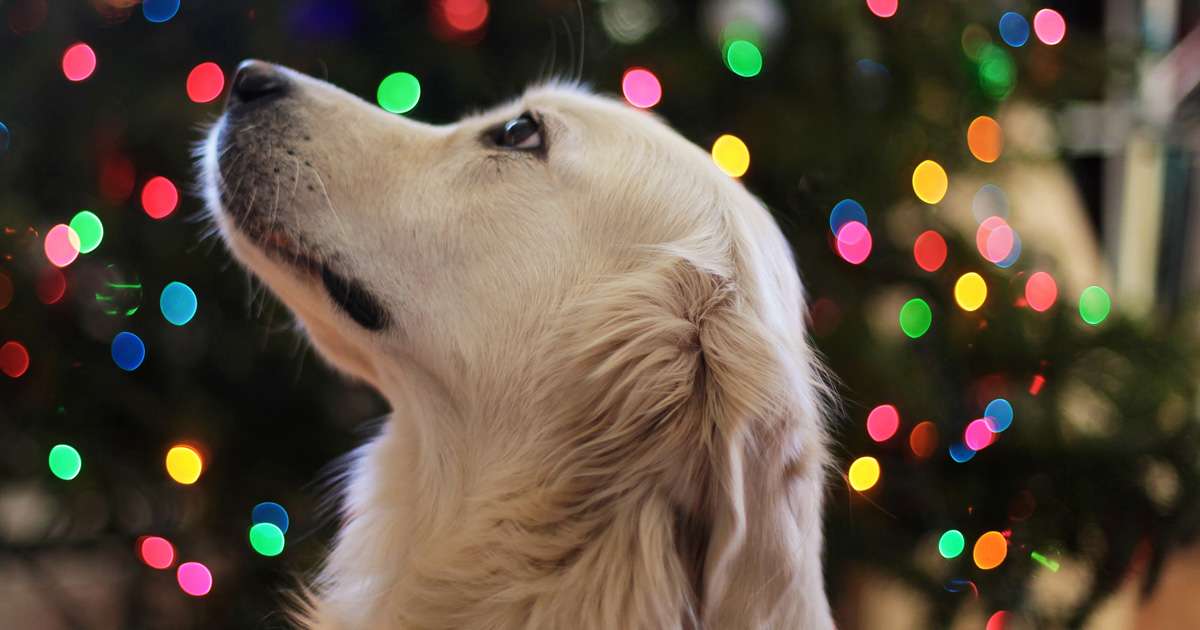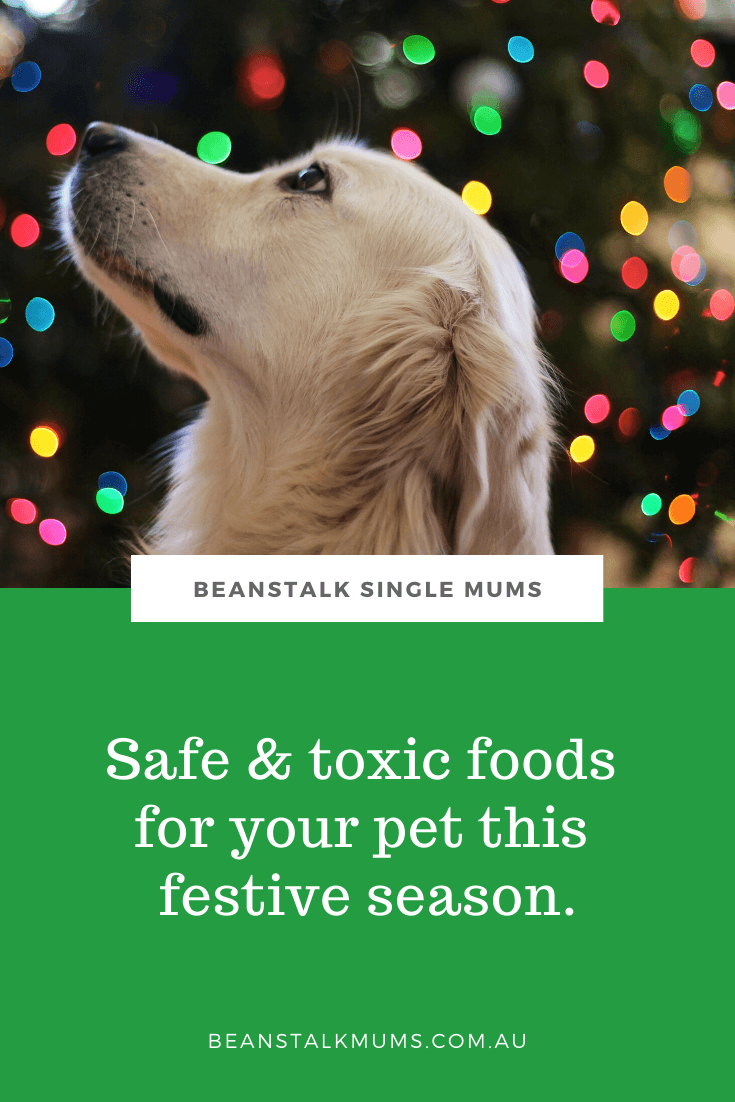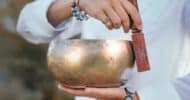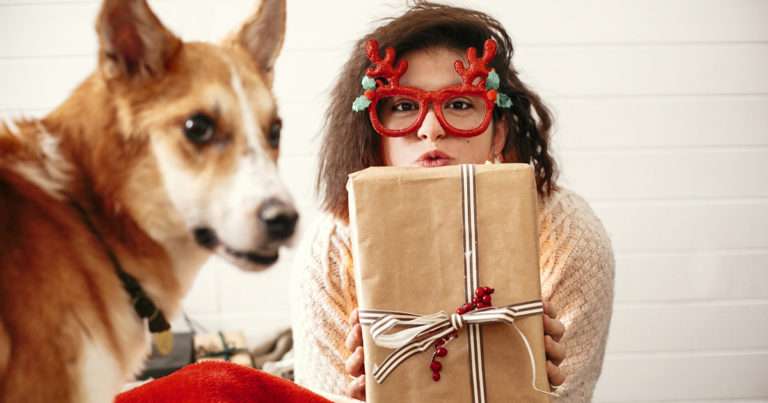
We all know how tempting it can be to sneak a treat (or two) under the table to your drooling furry family members during the festive season.
For mums new to pet parenthood, it’s important to be educated on which foods are safe to give your pet, particularly leading up to Christmas when there is an abundance of different foods so readily available.
Certain foods that we love to indulge in over the holidays can be harmful to our buddies. To ensure your pet stays healthy this festive season, PETstock VET Dr Teresa Priddle has compiled a guide of naughty and safe foods this Christmas.
The Safe list
Leftover beef or chicken
Leftover meat is a delicious treat. However, all meat must be de-boned before given to your pet. Cooked bones can be harmful to dogs as they can splinter when broken down and are very difficult for your buddy to digest safely.
Fruit
Small amounts of apples, oranges, bananas, blueberries and watermelon are all healthy treats for our dogs at Christmas (especially when kept in the fridge and given on a hot day!). Just ensure all seeds are removed first and avoid any stone fruit.
Vegetables
Carrot sticks, sweet potato, green beans, cucumber, pumpkin and zucchini are also wonderful snack options. It can be difficult to sneak greens into their diet, so combining this with leftover beef or chicken is a great way to incorporate vegetables.
Christmas tip
Remember, everything in moderation! Although these foods are safe, they are still considered treats, particularly when given in addition to their regular dietary routine. If you have a track record of giving in to those puppy eyes and drooling mouths, it is best to remove your buddy from the dining area – this will limit the chances of your pet being fed by yourself (or sneaky guests!)
It is vital to maintain your dog’s healthy weight. If your pooch is 15% over their ideal weight, they are considered obese. This can lead to severe health conditions such as heart disease, joint problems, diabetes and premature ageing.
The Naughty list
The naughty list is far greater than the safe list for pets and includes items you probably didn’t know were considered unsafe or toxic. Below is a list of items you should refrain from sharing not only at Christmas time, but all year round.
Chocolate
It is widely understood that chocolate is harmful to pets, but what makes it so poisonous to our buddies? The cocoa seeds that give chocolate its delicious qualities also contain a compound called theobromine, which is highly toxic to cats and dogs. If consumed, it causes serious illness or possibly death.
Raisins and grapes
Raisins and grapes can be fatally toxic to dogs, even in small quantities, so no Christmas pudding or cake for our four-legged friends.
Macadamia nuts
Macadamia nuts are readily enjoyed at Christmas but are poisonous to dogs and can cause vomiting, weakness, fever, depression and muscle tremors if consumed.
Onions
Ingesting onions can contribute to stomach upsets and even cause anaemia. Onions are consumed heavily in our diets and sneak their way into many Christmas recipes, so please ensure you double check ingredients before feeding anything to your pet.
Under-cooked meat
Just like humans, your pets can suffer the effects of eating under-cooked meat. Under-cooked meat can contain e-coli and other bacterial dangers. Under-cooked chicken can be especially risky.
Pork, bacon and ham
Pork is possibly the most common choice of meat at Christmas, but very harmful to our furry friends! Some pork products contain a high amount of fat, which can lead to illnesses like pancreatitis. Statistics show an increase of pancreatitis cases in dogs at Christmas time!
Alcohol
While it may seem obvious, I feel it still must be put on the naughty list. Allowing our pets to consume any alcohol is dangerous. It can cause alcohol toxicity and, in some cases, seizures.
Milk and dairy products
It may surprise many to learn that dogs’ bodies weren’t designed to process dairy. Consuming dairy can cause stomach upsets, vomiting and diarrhoea
Lollies
Lollies should probably be on the naughty list for humans, but they are even worse for our pets. Loaded with sugar, lollies can disrupt your pet’s metabolism and when consumed in high amounts, can even cause diabetes.
Christmas tip
Out of sight, out of mind! Keeping items from the naughty list in high, unreachable places is highly recommended in the chance your buddy decides to get a bit sneaky or adventurous! Again, if you have a platter on a low table with foods from the naughty list, removing your pet from the area is the easiest way to ensure nothing will be consumed.
Dietary tips for puppies over Christmas
If you have recently welcoming a puppy into your home, it’s important to continue their regular super-premium diet over the holidays to ensure they receive all the nutrients they need for their growing bodies. Feeding a mix of wet and dry food is a good option, as the dry food will help strengthen your pup’s gums and teeth.
If you are switching foods, ensure you do this gradually to avoid gastrointestinal upsets. Start by adding a small amount of the new food to your pup’s existing diet, then increase this over the coming days while reducing the amount of the other food, until your pup has completely switched.
Puppies should stay on a puppy diet until 12 months of age. Larger breed puppies, such as Great Danes and German Shepherds (to name a just a few), can be fed a puppy diet until 18 months of age.
For more information on how to keep your pet safe, healthy and happy over Christmas, visit Petstock here.

Now what to get everyone for Christmas …
24 Gifts for teenage boys that have nothing to do with gaming
24 Gifts for teenage girls that have nothing to do with iphones
30 Cool stocking fillers for little boys
20 Cute stocking stuffers for little girls
50 Gifts for dad for under $50
12 Hilarious gift ideas for your ex














